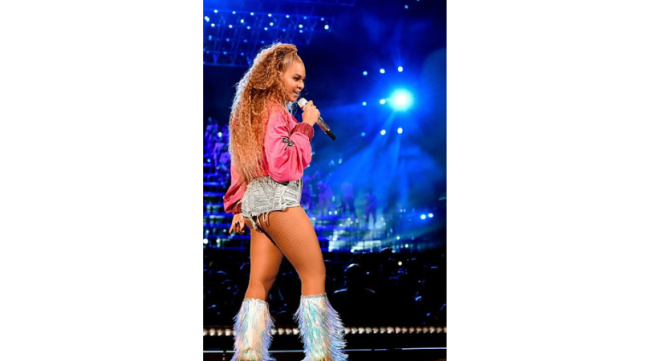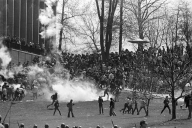You have /5 articles left.
Sign up for a free account or log in.

Beyoncé at the 2018 Coachella Valley Music and Arts Festival
Getty Images
Beyoncé headlined the 2018 Coachella music festival. That’s last year’s news. This year’s news: Netflix recently released a feature-length documentary film about the megastar’s preparation for what many fans renamed Beychella. Homecoming is more than a concert film. It is a deeply personal window into the singer’s pregnancy complications, her diet and body image struggles, the demands of juggling motherhood and career, and grueling preparation for one of her greatest live performances.
It also showcases many distinctive cultural assets of historically black colleges and universities, including their marching bands and Greek-letter organizations. This documentary is not the first project to do this -- Spike Lee’s 1988 film School Daze, the acclaimed 1990s television series A Different World and the hit BET series The Quad are a few others. In my opinion, this one is the best.
Homecoming is an impressive blend of behind-the-scenes footage and soulful, electrifying stage performances. Throughout the film, musicians, dancers and steppers that resemble students in an HBCU marching band and in a fraternity accompany Beyoncé. This excited me because, 25 years ago, I enrolled at Albany State, a public HBCU in Georgia, where I spent four years on the drum line in our marching band. I also pledged Kappa Alpha Psi, a historically black fraternity, while I was there. Hence, just about everything in Homecoming resonated powerfully with me.
Beyoncé says in the film that she did not attend an HBCU, or any other college. She does note that Destiny’s Child, her previous singing group, often visited and rehearsed at Prairie View A&M and Texas Southern, two HBCUs near Houston, her hometown. I found impressive and surprising that someone who had not been a member of a black college band could capture the experience with such cultural authenticity.
From the sounds of the musical instruments to the rhythmic movements of the dancers and steppers, the Coachella stage in every way resembled stadium stands of an HBCU football game. Of course, documenting this on film was not enough for Beyoncé; she also released a 40-track album with songs from the live performance. Every song, which is accompanied by the live band, is a sonic masterpiece. The sound is reminiscent of the Jackson State University marching band, which is frequently referred to as the Sonic Boom of the South.
It is worth noting that HBCUs are much more than their marching bands. United States education secretary Betsy Devos mischaracterized them as exemplars of “school choice.” Instead, these institutions were founded in an era when black students had no other college options. Today, they educate more than a quarter million black students, and account for roughly 9 percent of black enrollments in American higher education. They have always been sites of cultural recognition and affirmation.
Near the beginning of Homecoming, Beyoncé delivers a soulful rendition of “Lift Every Voice and Sing,” which is affectionately known as the Negro National Anthem. I remember attending numerous events at my undergraduate institution that began with this song; its lyrics and harmony always set a tone of cultural pride. Also, the film includes quotes and audio clips from intellectual greats like W. E. B. Du Bois, Maya Angelou, Toni Morrison and Cornel West. Black students at HBCUs, unlike the majority of their same-race peers who attend predominantly white institutions, are frequently assigned texts written by iconic and contemporary black scholars. They learn about themselves and their cultural histories. And most professors who teach them are black. Every day, these collegians are immersed in black culture inside and outside classrooms.
While the black band members filmed in Homecoming were on stage, as well as in scenes from months of preconcert rehearsal footage, they clearly felt like they belonged at Coachella, a space that typically has little black representation. It was apparent that they admired Beyoncé and deeply respected the manner in which she engaged with them. What I saw on their faces and in these interactions are ordinary features of HBCUs.
The title of this Netflix project is also noteworthy. Because of the strong sense of belonging these colleges engender among many black students who attend them, annual HBCU homecoming events attract graduates and supporters who help create atmospheres that feel more like family reunions than collegiate athletic events. Homecoming is one of the most important weekends at every HBCU that hosts one. That Beyoncé so masterfully captured the energy and excitement of this occasion in a California desert concert venue is a testament to the carefulness with which she studied this specific HBCU cultural activity.
Beyoncé mentions at least twice during the film that she is the first black woman to headline the now 20-year-old music fest. In the most unapologetic fashion, she immersed the Coachella audience -- and now viewers of the documentary film -- in some elements of black culture. She disrupted what typically happens during this annual event by making it as black as possible. A two-night concert was the venue through which a bold, outrageously talented multimillionaire highlighted much more about black colleges beyond their marching bands. She used the platform to elevate HBCUs, which is necessary, as some Americans lack an understanding of why these institutions are so important to black communities.
My HBCU had 3,300 students when I was a student there. The University System of Georgia recently decided to consolidate it with a nearby college that enrolled considerably higher numbers of white students. I was opposed to this merger. I reflected on its likely consequences as I watched Homecoming. I was left wondering how much respect there would be for the deeply meaningful black culture that had long been established at my alma mater. Will the new white students react with the same sense of appreciation and excitement as white Coachella attendees, or will they attempt to dismantle Albany State’s black culture? Will “The Star-Spangled Banner” now be sung at campus events instead of James Weldon Johnson’s anthem? I hope not. I want homecoming and all other days at Albany State to be as rich in black culture as was Beychella.
One month after taking office, Donald Trump signed an executive order in support of HBCUs; he also hosted several HBCU presidents at the White House. Their subsequent appraisals of his commitment are mixed. But HBCU presidents, as well as alumni and students, are unlikely to disagree much on the impact and cultural integrity of Beyoncé’s epic two-night performance, Netflix documentary and live album.








